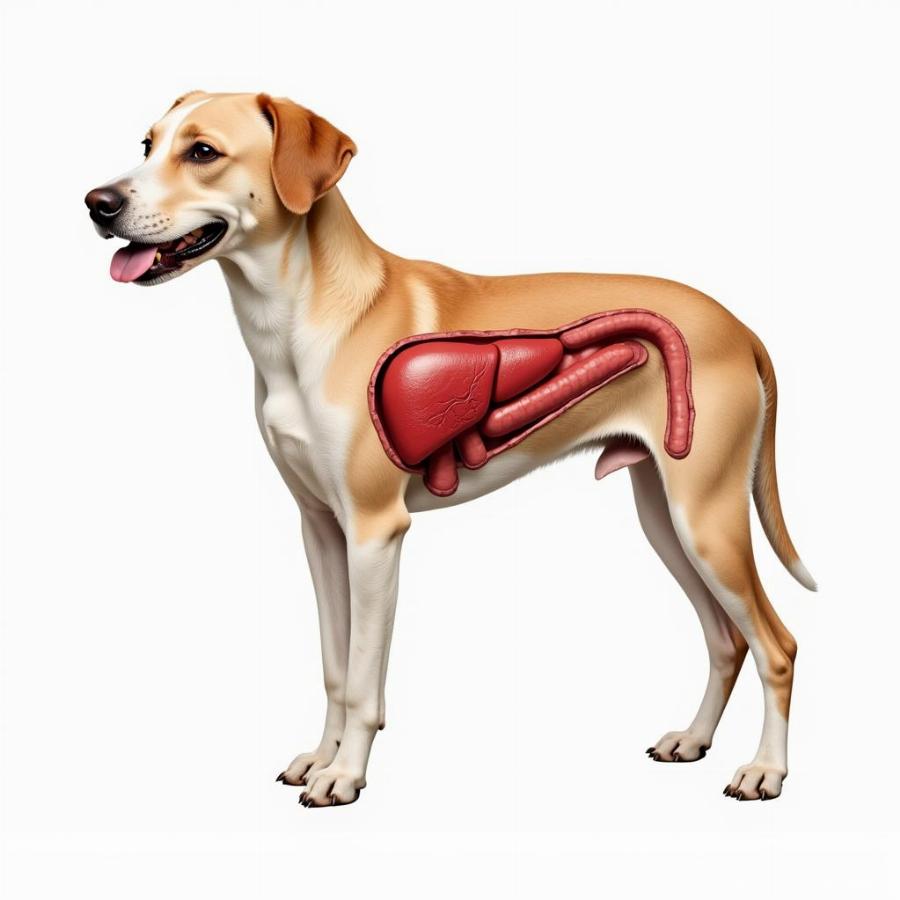Gallbladder problems in dogs can be a serious health concern, ranging from uncomfortable to life-threatening. Understanding the signs, symptoms, diagnosis, and treatment options is crucial for any responsible dog owner. This comprehensive guide will delve into the intricacies of dog gallbladder issues, equipping you with the knowledge you need to ensure your furry friend’s well-being.
Understanding the Canine Gallbladder
The gallbladder is a small, pear-shaped organ located near the liver. Its primary function is to store and concentrate bile, a digestive fluid produced by the liver. Bile aids in the digestion and absorption of fats. When a dog eats a meal containing fat, the gallbladder contracts, releasing bile into the small intestine. Various factors can disrupt this delicate process, leading to dog gallbladder issues.
 Dog Gallbladder Issues
Dog Gallbladder Issues
Common Dog Gallbladder Issues
Several conditions can affect a dog’s gallbladder. Some of the most prevalent include:
- Cholelithiasis (Gallstones): These are hard, pebble-like deposits that form within the gallbladder. They can vary in size and number, and their presence can lead to inflammation and blockage of bile flow. can dogs have mint
- Cholecystitis (Gallbladder Inflammation): This often occurs as a result of gallstones, bacterial infections, or other underlying health issues. Inflammation can cause the gallbladder wall to thicken, leading to pain and impaired function.
- Gallbladder Mucocele: This condition involves the excessive thickening of bile, forming a sludge-like substance that can obstruct the gallbladder and bile ducts. dog taking a poop
- Gallbladder Rupture: A ruptured gallbladder is a life-threatening emergency that requires immediate veterinary intervention. It can lead to bile peritonitis, a severe infection of the abdominal cavity.
Recognizing the Signs and Symptoms
Dog gallbladder issues can manifest in a variety of ways. Some common signs to watch out for include:
- Vomiting: Frequent or persistent vomiting can be an indicator of gallbladder problems.
- Diarrhea: Changes in bowel movements, including diarrhea, can also signal digestive issues related to the gallbladder.
- Jaundice (Yellowing of the Skin and Eyes): This occurs when bile pigments build up in the bloodstream due to impaired bile flow.
- Abdominal Pain: Dogs experiencing gallbladder pain may exhibit signs of discomfort, such as whimpering, restlessness, or a hunched posture.
- Loss of Appetite: A decreased interest in food can be a general sign of illness, including gallbladder issues. what would cause a dog to poop blood
- Lethargy: A noticeable decrease in energy levels can accompany gallbladder problems.
Diagnosis and Treatment Options
If you suspect your dog is experiencing gallbladder issues, it’s crucial to seek veterinary care promptly. The veterinarian will conduct a thorough physical examination and may recommend diagnostic tests such as:
- Blood tests: To assess liver and gallbladder function.
- Urinalysis: To detect the presence of bile pigments in the urine.
- Abdominal ultrasound: To visualize the gallbladder and identify abnormalities.
- X-rays: To rule out other potential causes of the symptoms.
Treatment for dog gallbladder issues will depend on the specific diagnosis. Options may include:
- Medication: To manage pain, inflammation, and infection. cholelithiasis in dogs
- Dietary changes: A low-fat diet can help reduce the workload on the gallbladder.
- Surgery: In some cases, surgical removal of the gallbladder (cholecystectomy) may be necessary.
How can I prevent gallbladder issues in my dog?
While not all gallbladder issues are preventable, maintaining a healthy weight for your dog and providing a balanced diet can minimize the risk. dog poop pile
Conclusion
Dog gallbladder issues can be complex and require prompt veterinary attention. Recognizing the signs and symptoms, seeking early diagnosis, and following the recommended treatment plan are crucial for ensuring your dog’s health and well-being. By staying informed and proactive, you can help your furry companion navigate these challenges and enjoy a happy, healthy life.
FAQ
- Are certain breeds more prone to gallbladder issues?
- What is the prognosis for dogs with gallbladder problems?
- What are the long-term effects of gallbladder removal in dogs?
- How can I manage my dog’s pain after gallbladder surgery?
- Are there any natural remedies for dog gallbladder issues?
- What should I feed my dog after gallbladder surgery?
- How often should I take my dog for checkups after gallbladder treatment?
Beaut Dogs is your one-stop resource for all things related to dog care. We provide comprehensive information on various breeds, health concerns, and expert advice on nutrition, training, and overall well-being. For personalized assistance and answers to your specific questions, please contact us at Email: [email protected]. Beaut Dogs is committed to helping you provide the best possible care for your beloved canine companion. Visit https://beautdogs.com today!